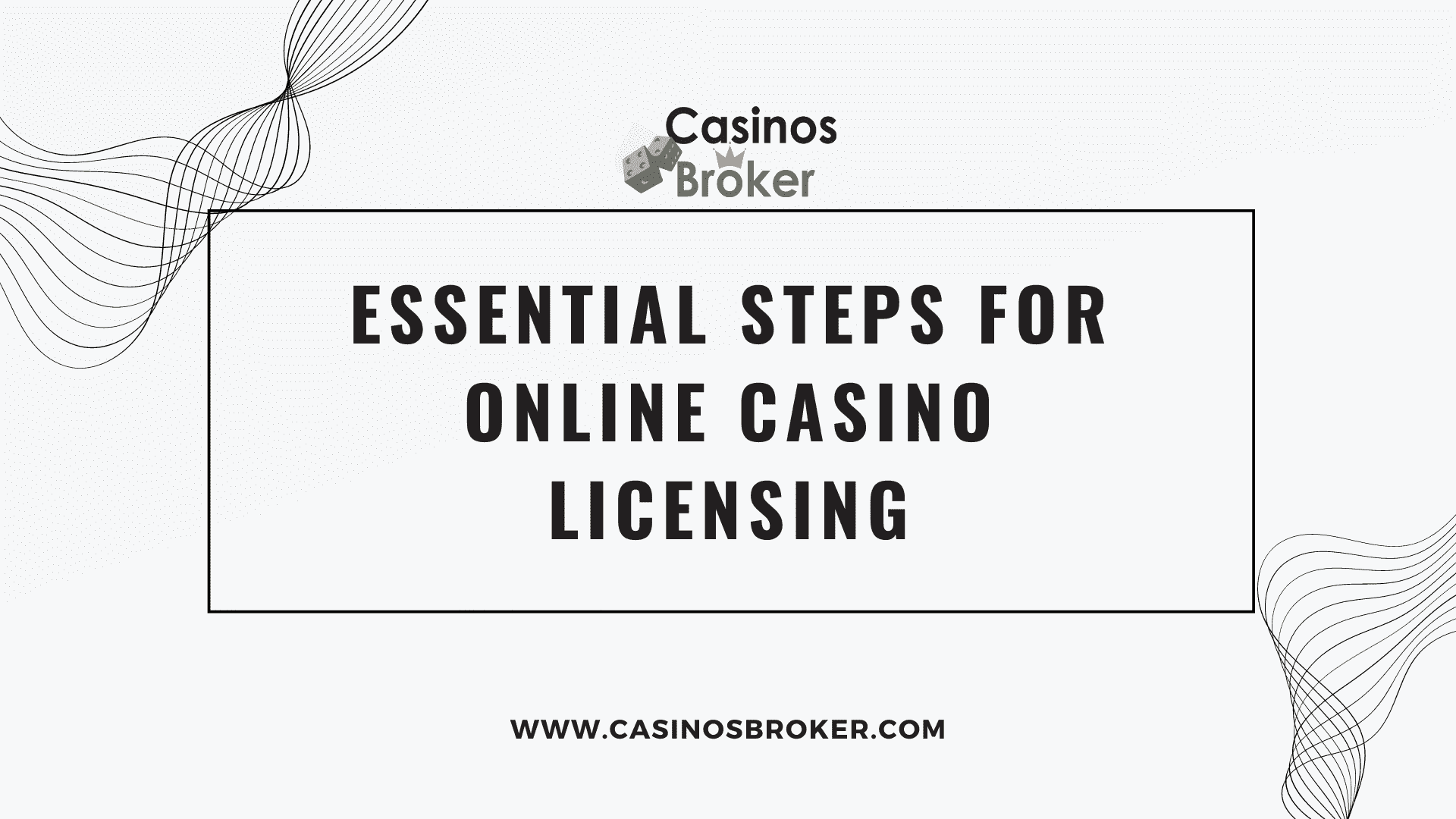Online gaming leads the way in new ideas. Websites for betting on games and sports are quickly seeing the value of cell phones. Now, most gambling, about 58%, is done on the internet.
Gambling is a rich sector, which is why webmasters, operators, and investors are successfully joining the market and profiting handsomely from traditional casino games (poker, roulette, and blackjack), sports betting, and even cybersports. According to VIXIO Gambling Compliance, iGaming income will top 18 billion dollars in the United States alone by 2025! However, where there is huge money, there are also severe licensing requirements. Let’s take a closer look at how and where you can obtain the coveted license to rise to the top and become an iGaming expert.
Exploring New Territories: The Online Gambling World
From 2023 to 2030, the worldwide online gaming market will increase at an average annual pace of 11.7%. By 2028, it might be worth $104.5 billion, with over 590 million gamers currently. These figures are the result of increased internet use, cultural acceptance, corporate sponsorship, and gaming legality. Finally, the development will contribute to the popularization of iGaming:
- Vnyz Research predicts that the VR headset market will generate $161.1 billion in revenue.
- Blockchain technology provides enormous solutions to the security issues related with money transactions in gambling. TripleA believes that there are over 420 million digital currency holders globally.
- Mobile devices. According to Statista, mobile gaming is expected to reach 1.9 billion users by 2027, with various game forms.
- Chess, Sudoku, Checkers, Chess, and Scrabble are gaining popularity in online casinos. Cybersport is rapidly expanding, with the market expected to be worth $6.75 billion by 2030.
Sports betting and quick win games are gaining popularity not just in Asia-Pacific, but also in Europe. With the advancement of VR and blockchain technology, businesses are increasingly focusing on developing novel platforms to suit client needs and achieve competitive advantages. To strengthen their market presence, the leading firms engage in mergers and acquisitions, alliances, and product innovation. This is hardly surprising considering ~85% of American adults have played at online casinos at least once in their lives, and ~1.8 billion of the world’s population do so frequently, with over 5 billion doing so at least once each year.
Online Gambling with a License: What privileges do companies receive?

When entering the iGaming sector, operators and entrepreneurs should go through a specific “face check. This involves the licensing of businesses. If you intend to enter the market as an online casino operator, make sure to prepare your wallet (the cost of starting a business is very costly) and documentation (the requirements for business legalization are very tight).
Advantages of Licensed Online Casinos
- Guaranteed payments. Clients, including players, payment system partners, and providers, place more trust in such online platforms. All financial transactions are rigorously regulated by legislation, which eliminates the chance of fraud.
- Easy access to internet casinos. Regardless of geography or status, anyone of legal age can register and begin playing.
- Fair Play: The game’s fairness is ensured by using only tested and certified random algorithms.
- Content from certified providers: Official online casinos exclusively collaborate with reputable developers, ensuring the fairness and quality of games. All games are thoroughly tested and certified.
- Client data confidentiality: The client’s personal information is safely safeguarded against hackers and fraudsters, ensuring their safety and peace of mind.
- Attractive bonuses and promotions to attract new gamers and keep existing consumers.
- Blockchain technology innovations: Some regulated casinos use blockchain technology to improve the transparency and security of their gaming operations.
With a license, you can prevent dangers like transaction banning, account freezing, licensed game content, sanctions, and legal concerns.
Everything you need to know about getting an online gambling license
A gambling license is a certificate granted by a licensing body. It can only be obtained by submitting an application to the local regulatory authorities in Curacao or Canavaca (a lower-cost option), Macau, USA, Gibraltar (high-status licenses), and other regions. Your decision will most certainly be impacted by the license’s cost, the intricacy of the process, and the prestige of the jurisdiction.
The licensor sets the criteria for candidates and monitors their performance. These criteria include financial documentation, audits, and gaming operations. Compliance with the AML/KYC Directive is critical, as it requires the implementation of internal measures to avoid illicit activities like money laundering, terrorist financing, and corruption.
The procedure of obtaining a license varies by area, but the underlying principles are universal. Its primary purpose is to ensure the applicant’s motivations are transparent and that their company activities are ethical. The permission process resembles a difficult endurance race, with various perplexing bureaucratic obstacles to overcome. Certain requirements must be satisfied in order to obtain a gaming establishment license.
- Charter confirms company registration.
- Corporate documents
- Bank Account Opening References
- Copies of the founders’ and all staff’s passports, together with confirmation of no criminal record
- Business, budgetary, and marketing plans
- Technical documents, including software and hardware certificates.
Malta, Cyprus, Macau, and the United States are now the most popular regions for licensing online gambling platforms.
Offshore Jurisdictions for Gambling Business: how not to get lost in choice

When selecting a jurisdiction for your gambling business, you should take many crucial things into consideration:
- The amount of the licensing fee can vary substantially between countries. For example, in the United Kingdom, it is around £10,000 per year; in Russia, it can reach 6 million rubles per year; and in Curaçao, it is €20,000 per year.
- The amount of skill in the field, as some jurisdictions (USA, Malta, UK) may need a specific level of knowledge to obtain a license.
- The number of licences required. In the United States, for example, a license is required for each state that allows internet gambling. In Malta, obtaining a Malta Gaming Authority license is sufficient, however in Curacao, an eGaming licence is required.
- Administrative expenditures associated with document preparation and licensing procedures. These may include legal and consulting expenditures for creating relevant documentation, conducting audits, paying government fees, training employees, and assuring the gaming platform’s security.
- Tax conditions in the jurisdiction. Curacao, for example, levies a flat licensing price. Licensees on the Isle of Man pay 0% business tax. Malta taxes gambling money at roughly 5%, but Costa Rica does not tax profits.
- The type of gambling activity: casino, sportsbook, or any other type of gaming. All of these are notably popular in Las Vegas and Atlantic City, Monaco and Paris, Montreal, Ontario, and Mexico’s resorts.
The top gambling territories in 2024 that ensure honest and secure gambling practices include Curacao, with its primary overseer, the Curacao Gaming Commission, Malta (MGA), which grants permits for B2C and B2B operations, the Isle of Man, with the Gambling Supervision Commission overseeing both online and land-based casinos, and Kahnawake, a Native American reservation within the state.
Gambling Industry: What financial consequences await license holders?
Issuing a gaming licenses can have a variety of financial consequences for a firm, both positive and negative. The costs associated with obtaining a license might be high, especially given the numerous restrictions and formalities imposed by the government, as shown in Malta. Malta, on the other hand, has a stable economy, low tax rates, and four types of licenses: remote gaming, betting, poker rooms (or peer-to-peer P2P gambling), and B2B.
Kanawake is often regarded as the most economical license option, with annual rates starting at under €10,000.
Once the license is issued, the company must pay gambling taxes, which can have a substantial impact on its financial status. However, in some situations, businesses might receive tax credits or other incentives that can help them cut expenses and raise revenues from the gambling industry.
What is the cost of applying for a gaming license in different countries?
- Curacao. The cost of applying for a sublicense is determined by the holder of the master’s license. The owners of these permissions decide whether to give sub-licenses and how much the licensing cost will be.
- Malta. The set fee for applying for a license is €5000.
- Isle of Man. A £5,000 charge is required here. After successfully obtaining the license, operators must pay an annual fee of £35000 to preserve their status as a licensed gambling service.
- United Kingdom. The application price varies based on the type of license requested and the company’s gambling income. The regulating organization divides gambling into three categories: online casinos, virtual betting on various events, bingo, and internet pool betting. The licence fees for each category are £4224, £4690, and up to £7000, respectively.
- United States of America. Before engaging in any gambling activity in the United States, you should be aware of the expense of getting a gambling license, which starts at $1 million. These fees cannot be avoided because a license is a basic necessity for legitimate activities.
Impact Factors: the importance of political and economic stability in a country

Political and economic stability are required for the gaming industry to develop steadily and successfully in the chosen jurisdiction. Their absence in countries causes legislative changes that harm the profitability of casino operators. Furthermore, this undermines public perception of the gambling sector.
Malta, Curacao, Kanavake, Costa Rica, and Anjouan are examples of “foundations” for iGaming that are both stable economically and politically. However, there are counter-examples in the history of gaming.
- The financial crisis in Greece in 2009 reduced demand for gambling enterprises.
- The United States’ ban on online gambling in 2006, known as the Unlawful Internet Gambling Enforcement Act (UIGEA), resulted in the shutdown of many online casinos and poker rooms for American players.
- The Venezuelan economic crisis resulted in lower incomes and decreased demand for gaming.
- Many casinos in Turkey will close in 2022, and internet platforms will be outlawed as a result of political instability and stronger regulatory measures.
- In Japan, legislation were passed in 2022 to prohibit online casinos due to the government’s fears about potential rises in crime and gambling addiction among individuals.
How to Protect Personal Data: An overview of data protection in different countries

User data contains personal information such as financial and game histories, bringing privacy concerns to the forefront. Licensed online gaming operators must follow the required data protection standards. Some tight licenses mandate data encryption and secure storage. Malta, the United Kingdom, Gibraltar, and Curacao, for example, have established stringent security standards for the iGaming industry and require compliance with the GDPR.
The confidentiality of user information is a critical feature of data protection. Operators that violate data protection laws may face fines and lose their license to operate in the relevant country. Customers receive a high level of data protection through the following measures:
- Malta: Local data protection includes GDPR.
- Gibraltar is governed by the Data Protection Act.
- United Kingdom: Data Protection Act is in place.
- Curacao: Improves its rules and standards year after year.
- Costa Rica is slowly but steadily improving its data privacy legislation.
The strength and lasting power of the area as a key to triumph in the iGaming industry
Choosing the correct jurisdiction ensures the company’s dependability and legitimacy, as well as protecting it from any hazards and regulatory problems.
Examples of nations where you can register an online gambling firm, based on sustainability and strategic fit for the jurisdiction:
- Malta has supportive legislation, an advantageous tax environment, and high standards of industrial regulation.
- Gibraltar has sufficient stability and a solid reputation in the international setting.
- Great Britain has tight gambling regulations that guarantee a high level of security and authenticity for the industry.
- Curacao provides a flexible tax system and relatively inexpensive licensing charges.
- Costa Rica has easy and permissive legislation for online gaming, which may appeal to tiny start-ups and operators.
The selection of a jurisdiction is influenced by a variety of criteria, including licensing requirements, tax laws, the country’s reputation, and sustainability.
Understanding the Consequences of Operating Without a Gambling License

In certain countries, such as Costa Rica, not having a gambling license is not a problem because it is quite straightforward to establish a corporation for betting and gaming operations. However, in other situations where a license is required, obtaining one becomes an absolute need. Otherwise, engaging in such actions is considered illegal and may result in scrutiny from law enforcement, the judicial system, and other regulatory agencies.
Running an unregistered online gambling operation is against the law and may result in serious consequences in the form of large financial penalties totaling millions of dollars. Furthermore, illegal gambling operations may result in the closure of the website and the prohibition of the business owner from participating in similar projects in the future. For example, in countries such as China, Thailand, and the UAE, the penalties for operating an illegal internet casino may be significantly less severe than the suggested punishment!
Do you want your company to have a poor image, no reputation, and ambitions of economic success dashed? Gambling company owners must scrupulously follow the rules of their respective jurisdictions and receive the essential permissions and licenses to operate.
Jurisdictional Clash: Examining Different Gambling Licensing Procedures
The iGaming business is quickly increasing, creating an excellent opportunity to enter the profitable gaming industry. The most appealing licensing frameworks for gambling firms are easily accessible. If you are looking for options with minimum bureaucracy and low tax duties, investigate the jurisdictions listed below, which provide considerable benefits to gaming businesses.
Curacao
Curacao, a Dutch Caribbean island, was a pioneer in legalizing online gambling. More than 450 organizations currently hold licenses in this region.
- Minimal tax rates.
- Quick licensing procedure (within two months).
- Universal license that covers all types of gambling operations.
- Option for remote license acquisition.
To obtain a license, an applicant must complete the necessary papers and send it to one of the Master License Bureaus. Typically, the paperwork is examined within a fortnight. Creators, stakeholders, and executives must have clear criminal histories and financial commitments, no blocked IP addresses from restricted countries, and RNG accreditation or relationships with game suppliers. The license is valid for twelve months and can be extended, with a 2% operational tax rate.
Malta
The process of registering a business in Malta is distinguished by a welcoming attitude. The government ensures that online casinos and other gaming companies receive a warm welcome in this jurisdiction. What makes obtaining a license in Malta worthwhile?
- Malta’s taxation is comparable to that of other enterprises, and registration fees are reasonable, ranging from €25000 to 35000 per year.
- Malta is famous for its trustworthy reputation in the European Union.
- A license from Malta holds tremendous relevance in the iGaming market.
- The country offers substantial opportunities in the fields of banking and payment processing.
- Malta is not regarded as an offshore jurisdiction.
- There are four types of gaming licenses available: B2C and B2B licenses that cater to both gambling and internet casinos.
The license purchase process involves company registration, bank account opening, MGA verification, business plan analysis, verification of foundation documents, and a system audit. A gambling license in Malta is valid for 5 to 10 years, and the review procedure might take up to 6 months.
The Isle of Man
It is a unique site in the English Channel, an offshore haven, and an essential component of the UK. Why is a license in the Isle of Man so valuable?
- Solid legal status.
- Minimum tax rate: 1.5% of profits.
- A single license applicable to all, including the bookmaking sector
- Customer-focused regulatory policy
- The option to purchase a primary license (for major businesses), a sub-license (for startups and small online casinos), or an additional network service license.
To begin, register a company on the Isle of Man, then set up an office and open an account with one of the banks. Then the share capital is deposited into the account. Servers for the online gaming platform must also be situated on the island. During the application procedure, the Commission reviews your business strategy and checks the technological infrastructure. The application for a gambling license takes several months to process. It has a 5-year validity duration and can be renewed thereafter.
Kahnawake
For more than two decades, the Kahnawake Gaming Commission has issued licenses for Internet gambling. Currently, this recognized governing entity has approved around 300 firms. This could be attributed to:
- Its global reputation – its license is recognized as one of the most prestigious
- The initial charge of €10,000 per year
- An expedited licensure application process, finished in 2-3 months.
- There is no tax on gaming profits—only fees for licensing and applications are imposed.
- The possibility for operators to remain anonymous.
The Kahnawake Commission offers the opportunity for all owners of online gaming platforms to get a license. Companies are not required to have a presence in this jurisdiction. Rather, they must just meet certain basic requirements, such as having shareholders, executives, and key personnel, as well as the appropriate equipment and software. The initial licensing price is $40,000, which serves as a sign of the operator’s commitment.
Greek
To receive a gambling license from the Greek Gaming Commission, various steps must be taken:
- Apply and include all relevant information on online games, operators, and payment methods.
- Verify your personal information and location – you must be in the nation.
- Obtain a certificate showing compliance with Greek legislation.
- Pay 35% of gross gaming revenue plus a licensing charge based on the type and term of the license. For example, an online casino license costs €2 million, whereas an online bookmaker license costs €3 million.
The license is valid for a maximum of seven years. To get a casino license in Greece, the applicant must meet specific standards, including as the formation of a legal business, a minimum share capital, physical presence in the country, a clean criminal record, and a positive reputation.
Effective Regulation: The Key to Safe Casino Gaming
As iGaming evolves, the choice of gambling jurisdiction becomes more crucial. To engage with the relevant authorities, you must first carefully research the requirements and file a licensing application. This process takes time and necessitates an awareness of all of the important legal issues of gaming. Turnkey online casinos have grown in popularity because they let licensed operators to focus on strategic development and market expansion.





